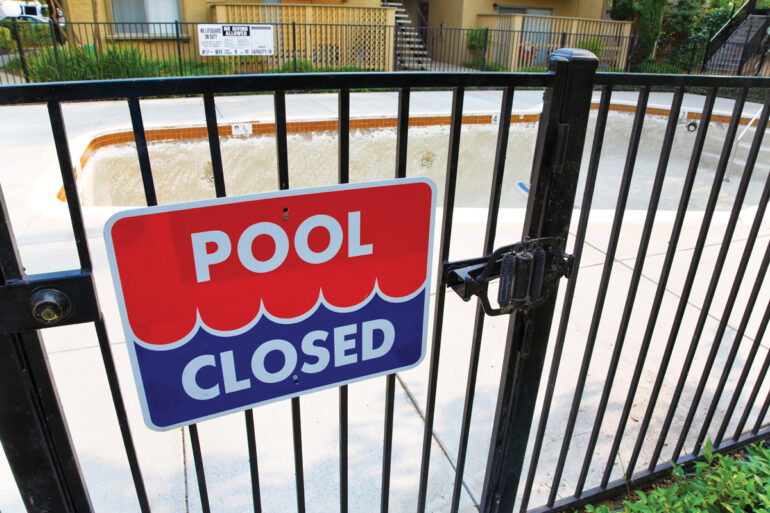Chlorine Gas Cloud Injuries at Public Pools
Preventing accidental bather exposure

If you go into your search engine and type “pool accident chlorine gas” in the news tab, you will see nearly 3,000 results within seconds — headlines such as “At least 35 people at San Jose swimming pool exposed to dangerous chemical mix.”
Chlorine gas is just that: A gas cloud of chlorine that can be extremely harmful. In swimming pools, it is commonly the result of unintended chemical injection that allows chlorine and acid to mix within the pool plumbing and then releases into the pool itself. It is a greenish-yellow gas that is heavier than air, so it tends to hover just above the surface of the water and is somewhat visible to the naked eye. Chlorine gas exposure can result in chemical burns. If inhaled, the gas will cause the pH of the blood to plummet, and may result in severe headache, vomiting, partial blindness and pulmonary edema. Fortunately, it is easily preventable in swimming pools.
The prevention of chlorine gas is a hot topic among heavy players in the industry. While at the World Aquatic Health Conference in Charleston, South Carolina, in October 2018, Kevin Boyer, COO of Poolsure, presented The American Chemistry Council Task Force’s report on chlorine gas exposure.
Having known Kevin for years and this, unfortunately, being a regular occurrence in swimming pools throughout the nation, I decided to attend. I found it to be one of the most important messages pertaining to pool water safety that would roll out in years.

Chemical injection during water circulation 
Continued injection minus water flow leads to dangerous gas formation 
Chlorine gas forced into swimming area when circulation resumes
Following the session, I caught up with Kevin and picked his brain a bit.
Kevin, how did you choose this career path in the pool industry?
Like many people, I fell into it and then fell in love with it. I started out with our parent company, Aquasol, and after spending a few years learning the industry, I began working with our team to develop Poolsure, our water management and service company. Poolsure is a service provider to commercial swimming facilities, operating primarily in Texas, Louisiana, Mississippi and Florida. We provide roughly 7,000 facilities with chemical and equipment service programs.
You were part of a team assembled by the American Chemistry Council to create a video designed to bring attention to accidental bather exposure to chlorine gas. How big of a problem is this in recreational water venues?
It’s hard to quantify, and I don’t believe anyone is aggregating incidents, but it happens very regularly around the world. Some of these are manual [chemical] mixing mistakes, but many are equipment related. Just one of these accidents is too many when prevention is so simple. It is counter-productive to our mission in the pool industry to have people scared of swimming in a pool. The goal now is to spread the word on how to prevent chlorine gas to the pool operators, managers and service companies.
I know that there are many contributing factors to protecting bathers from accidental chlorine gas exposure. Which would you say is the one area that requires the most attention in order to prevent such incidents?
This is a problem mostly of ignorance, so education of operators [is the biggest need]. It is truly a no- to low-cost solution to this problem. It is my belief that most facilities already have the correct safety switch in place. They just inadvertently bypass it in an effort to keep the pool operating during times the circulation system may not be flowing correctly, or the switches aren’t installed correctly to begin with. If a pool doesn’t have the correct safety switch, in most cases, it can be added for less than $200.
Where do we expect this focus to go from here?
Spread the word. The ACC created a free video for the industry. Please do anything you can to share it. Use it in CPO classes, other industry training, for company training materials, send it with newsletters, etc. Anything to get the word out. ACC just asks that the video be used in its entirety.

Rudy Stankowitz is a 28-year veteran of the swimming pool industry and CEO/President of Aquatic Facility Training & Consultants. He has conducted swimming pool related training/technical seminars throughout the United States, Canada, Puerto Rico, the Caribbean, South America, Europe and Asia. Originally, from Long Island New York, Rudy (an award winning NSPF Instructor) currently resides in Archer with his wife Joy and he has happily been a resident of Florida since 2003. pooloperatorcourse.com





